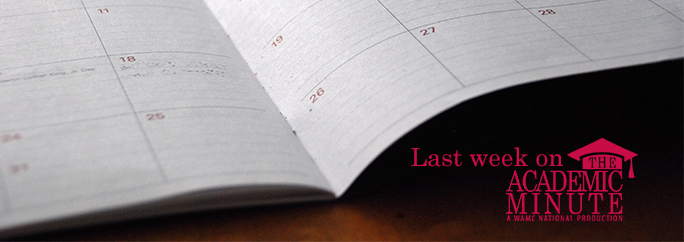The Academic Minute for 2018.10.22-10.26

Academic Minute from 10.22 – 10.26
Monday, October 22nd
Ashley Taylor – Colgate University
Intellectual Disability and the Producation of Knowledge
I am Assistant Professor of Educational Studies at Colgate University. I teach educational foundations courses in disability studies, inclusive education, and philosophy of education.
I received my Ph.D. in Cultural Foundations of Education at Syracuse University, where I specialized in Philosophy of Education and Disability Studies. I am especially interested in how citizenship and social belonging are conceptualized in relation to and experienced by people labeled with disabilities, and how institutions and processes of education shape and mediate these concepts and experiences. Much of my work considers the normative question of what constitutes educational justice for individuals labeled with intellectual disabilities. More broadly, I am interested in the intersections of ability, gender, and race in educational philosophy and theory. In all of my work, I view disability (and ability) in terms of its status as a gendered and racialized cultural, social, and political position both created and augmented through educational systems.
I hold an M.S. in Cultural Foundations of Education and a C.A.S. in Disability Studies from Syracuse University. My B.A. is in Contemporary Studies and Philosophy from the University of King’s College in Nova Scotia, Canada. Before pursuing graduate work, I worked as a caregiver and as an employment counselor/adult educator of people labeled with intellectual and physical disabilities.
Tuesday, October 23rd
Joe Erlichman – St. Lawrence University
Cerium Dioxide Nanoparticles
The brain is composed of two types of cells termed neurons and glia. Most of what we know about the processing of information in the brain involves the generation, propagation and transfer of electrical signals between neurons within the brain. Although it is clear that neurons play a pivotal role in all brain-related activities such as learning and memory, recent research suggests that glial cells may play a crucial role in normal neuronal function. The importance of glia in normal brain function may be related to their ability to regulate a variety of chemicals accessible to the neurons. The regulation of these chemicals is important to study because these substances that can have profound effects on the production of electrical signals in neurons and thus the manner in which information is processed by the brain.
Wednesday, October 24th
Suman Seth – Cornell University
Seasoning Sickness
Professor Suman Seth works on the social, cultural, and intellectual history of science and medicine. His interests include the history of medicine, race, and colonialism, the physical sciences (particularly quantum theory), & gender and science. He is the author of Difference and Disease: Medicine, Race, and Locality in the Eighteenth-Century British Empire, forthcoming with Cambridge University Press, and Crafting the Quantum: Arnold Sommerfeld and the Practice of Theory, 1890-1926 (MIT, 2010). He has served as the guest editor of a special issue of the journal Postcolonial Studies on “Science, Colonialism, Postcolonialism” (December, 2009) and of a ‘Focus’ Section of the Journal Isis on ‘Re-Locating Race.’ He is co-editor (with Prof. Patrick McCray) of the Journal Osiris and jointly leads (with Prof. Laura Stark) a working group on “History and Theory” as part of the Consortium for History of Science, Technology, and Medicine.
Thursday, October 25th
Sheila Molony – Quinnipiac University
Improving the Lives of People With Dementia
Sheila Molony, an authority on aging, geriatric care and dementia assessment, is leading a national conversation about this issue, and her research is changing how health professionals, caregivers and families care for people with dementia. She was among 27 health-care experts whose research comprised the Alzheimer Associations’ 2018 Dementia Care Practice Recommendation Guidelines. This year she will be inducted as a Fellow of the Gerontological Society of America and as a Fellow for the American Academy of Nursing.
Friday, October 26th
Joseph Ferrari – DePaul University
Procrastination
Joseph Ferrari, PhD, is a professor of psychology and Vincent dePaul Distinguished Professor at DePaul University in Chicago. He is a leading international researcher in the study of procrastination and is the lab director of DePaul’s Center for Social, Personality and Community Research. He has published numerous articles and books on procrastination and counseling procrastinators in academic settings. His latest book, “Still Procrastinating: The No Regret Guide to Getting It Done,” will be released later this year. With April 15 right around the corner, the American Psychological Association spoke to Dr. Ferrari about why some people put things off — such as filing their taxes — until the last minute.


